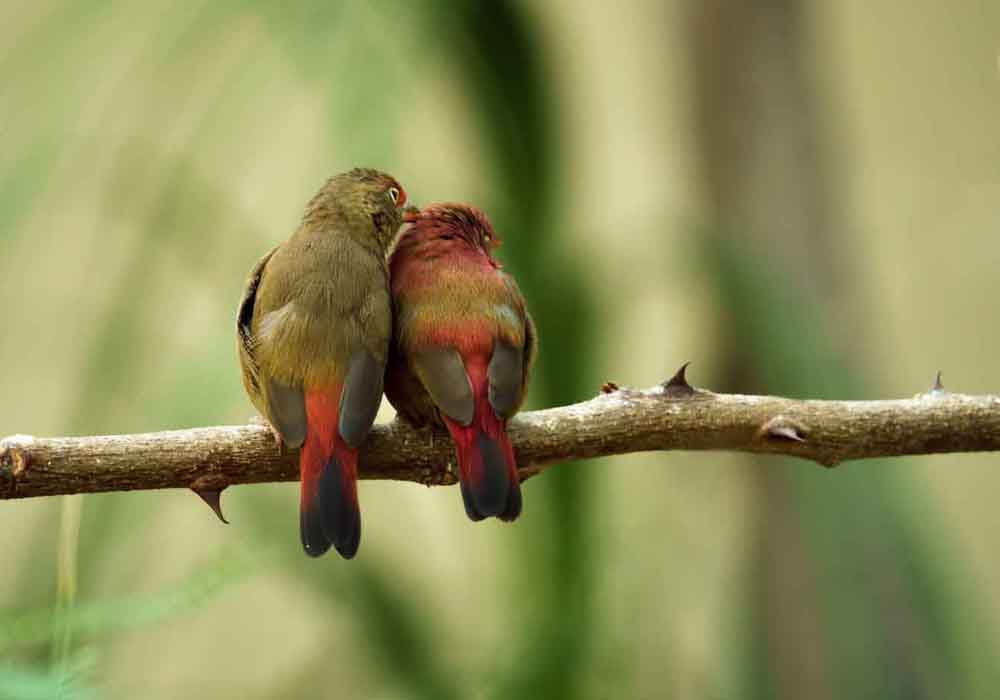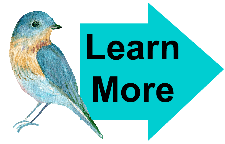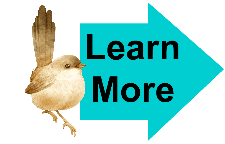Do Birds Go Into Heat?
People have debated whether birds go into heat for many years. Some people believe that birds do go into heat, while others believe that they don’t. So, what’s the scientific answer...do birds go into heat?
Female birds do go into heat, but not like how other animals do. Birds don’t have the same reproductive system as mammals; hormones do not control their bodies. Instead, birds have a process called "breeding cycles," determined by the bird’s exposure to daylight length.
I’ll discuss how birds ready themselves for reproduction in the following paragraphs. I will also share the signs that a bird is receptive to mating and how long it will last. After reading this article, I hope you’ll better understand birds and their reproductive system.

What Happens When Birds Go Into Heat?
When birds enter heat, their body temperature rises and triggers them to become more sexually receptive. The increased duration of daylight creates this response in female birds. The longer days stimulate their gonads, which produce the sex hormones needed for reproduction.
During this time, birds will mate more often and build nests. They may also lay more eggs than usual. After the breeding season, the bird’s body temperature will return to normal, returning to its standard mating and nesting habits.
Do Male Birds Go Into Heat?
Male birds don’t go into heat as this is strictly a female phenomenon, but they experience increased sexual activity in mating season, just like female birds. Male birds continuously produce sperm which they store in their cloaca—so they are always sexually receptive.
Notably, the cloacal openings of both male and female birds swell during the mating season. They will protrude more and appear brighter red than usual. The increased blood flow causes swelling in the area.
The male birds’ testes also increase in size during their mating cycle because they produce more sperm to fertilize the eggs.

Being in heat is one thing...attracting a mate is another. There's so many different ways birds do so, and we cover this in depth in our article How Do Birds Attract A Mate which can be found here.
How Do You Know When a Bird Is in Heat?
There are a few signs that you can look for to know when a bird is in heat. Birds become more than usual and may fluff up their feathers or becomes more aggressive. Birds also may display brighter plumage, eats and sleeps less, and exhibits some other unusual behavior in mating season.
Let us tackle these signs below:
Increased Vocalization
While birds sing throughout the year, they are particularly vocal during the breeding season. There are a few theories about why birds sing more during this time. One possibility is that birds use songs to attract mates.
By singing more loudly and frequently, birds can advertise their availability and fitness to potential partners. Singing may also help birds to assess the quality of potential mates. Studies have shown that female birds prefer males with more complex songs, which indicates good health and vigor.
In addition, birds may use songs to defend their territories and discourage competing mates. do birds go into heat
Fluffed-Up Feathers
Many bird enthusiasts have noticed that male birds often seem to have fluffier feathers when they are in mating season. There are a few reasons for this.
First of all, fluffed-up feathers help to make the bird look bigger and more impressive. This display is essential—because birds use their feathers to attract mates. They also use them to impress other birds in their flock.
Aside from aesthetic reasons, there’s also a scientific explanation for why this happens. Increased blood flow to the skin causes this extra fluffiness—which helps the birds to regulate their body temperature. Also, the high blood flow causes the birds’ plumage to stand up, making them appear larger and more impressive to potential mates.
Increased Aggression
When birds are in mating season, they are more likely to be aggressive. One reason for this is that birds need to compete for mates. They do this by fighting other birds and establishing dominance over their territory. This aggression helps them to secure a mate and ensure the survival of their species.
Another reason for their aggression is that birds in the mating season have higher testosterone levels. This hormone makes them more aggressive and less likely to back down from a fight.
Brighter Plumage
Plumage plays a vital role in avian mate selection. Birds with brighter plumage are more likely to find mates than those with duller feathers. One reason is that bright plumage is often an indication of good health. A bird with vibrant feathers is less likely to harbor parasites and disease, making it a more desirable mate.
In addition, the bright plumage may also help the bird to stand out from other birds of the same species, making it more likely to be noticed by potential mates.
Check out these amazing bird mating dances
in this YouTube video...
Changes in Sleep Patterns
When birds are in mating season, they often sleep less or have trouble sleeping. There are several reasons for this. First, birds need to be alert to mate successfully. They need to be able to find a mate and defend their territory.
Additionally, birds in heat often experience increased body temperature, making them less comfortable and more likely to have trouble sleeping.
Finally, birds in heat may also experience increased hormones, affecting their sleep patterns.
Decreased Appetite
Birds are more focused on mating and nesting than on eating so they may consume less food. In some cases, birds may even stop eating entirely for some time. Even though this seems strange, it makes sense considering the birds’ priorities during this time.
By cutting back on their food intake, birds can save energy they can channel into mating and nesting activities.
More Restless Behavior
Female birds in heat often seem to be more restless than usual. They may pace back and forth, fly around more frequently, or engage in other energetic activities. This increased activity is likely because of the birds’ high levels of hormones and their need to find a mate.
How Long Do Birds Go Into Heat?
Some birds may go into heat for only a few days, while others may enter heat for a few weeks. The length of their heat cycle depends on several factors, including day length and temperature. Other factors include food availability, predation pressure, nesting sites, and mating system.
Length of the Day Affects Heat Duration
A primary factor affecting birds’ heat cycle is the day’s length. In the northern hemisphere, the days are the longest in the summer and the shortest in the winter. This change in day length triggers a hormonal response in birds that leads to the onset of the breeding season.
Temperature Influences How Long Birds Stay in Heat
Another factor that affects the heat cycle of birds is temperature. Birds are ectotherms, meaning their body temperature mainly depends on their environment. When the weather is warm, birds are more likely to be active and mate.
Food Availability Plays Part
Food availability is also a factor that can affect the heat cycle of birds. When food is scarce, birds are less likely to breed as they need to conserve energy for survival. However, birds are more likely to mate and raise young when food is abundant.
Predation Pressure Influences Heat
Predation pressure can also affect the heat cycle of birds. If there are many predators in an area, birds will be less likely to breed because they must spend more time and effort avoiding predation. However, birds will be more likely to mate and raise young if there are few predators around.
Availability of Nesting Sites Promotes Mating
Nesting sites can also affect the heat cycle of birds. If there are plenty of nesting sites available, this can trigger a bird’s heat cycle as they will be able to find a suitable place to mate and raise young. However, if nesting sites are scarce, this can delay or prevent a bird’s heat cycle from occurring.
Mating Systems Determine Bird Reproduction
The mating system of birds can also affect their heat cycle. Monogamous birds tend to stay close to their mates in the breeding season. Birds that are not monogamous (polygamous birds) will go into heat regardless of whether a particular mate is present. This receptivity allows them to mate with multiple birds and to raise young with different partners.
 |
We've written many additional articles pertaining to the mating habits of birds which you can check out by clicking these links here... |
Breeding Season of Most Birds
Birds generally breed during the spring and summer months–when food is plentiful, and the weather is good. In temperate climates, the breeding season typically runs from late August until November. In more tropical climates, birds can breed year-round. Ultimately, there’s some variation depending on the particular bird species.
For example, migratory birds often breed earlier in the season so that their young will be independent when winter comes around. Non-migratory birds, however, can reproduce at any time during the year. Here are some specific examples:
- Birds nesting in cold climates (e.g., ptarmigans) often breed in early spring to give their chicks the best chance of survival.
- Birds nesting in hot climates (e.g., cactus wrens) usually reproduce later in the season so that their chicks won’t be born during the hottest part of summer.
- Some bird species (e.g., house finches) have two breeding seasons per year–one early and one late–to take advantage of different food sources available at other times.
Do Birds Go Into Heat?...Final Thoughts
Birds are incredibly complex creatures, and there is still much we have yet to learn about them, especially regarding how they reproduce. So, even though we may not have all the answers just yet, studying birds will surely provide us with many more insights in the years to come.
Back To The TOP Of This Do Birds Go Into Heat Page

About the Author...
Richard Worden, a dedicated bird lover for over 20 years, I love to share my in-depth knowledge and passion for birds. Read more About Me and my expertise in this field.
- We Know Birds HOME ›
- Bird Health and Care Information ›
- Do Birds Go Into Heat?
